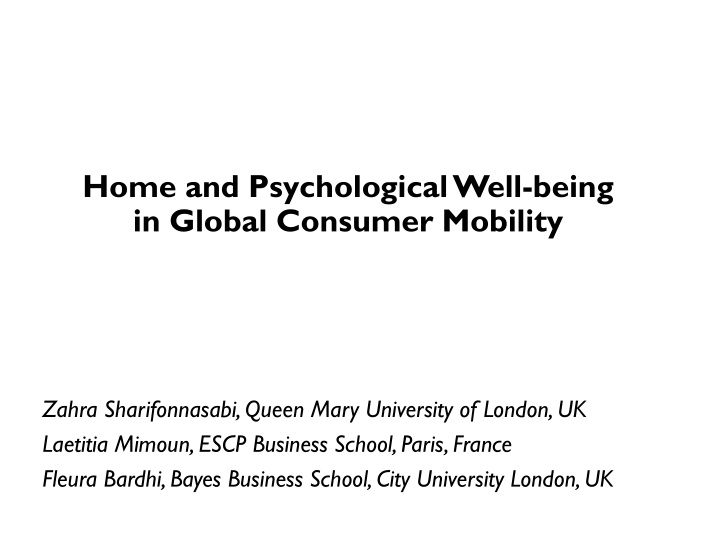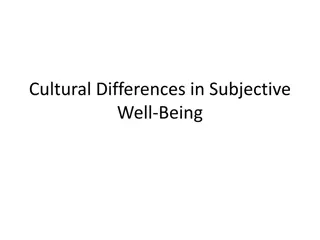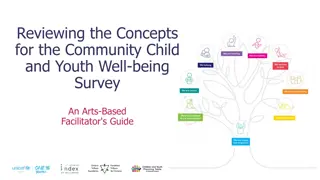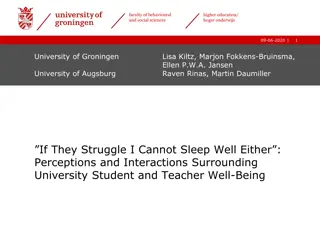
Complex Notions of Home in Global Consumer Mobility
Explore the intricate relationships between home and psychological well-being in the context of global consumer mobility. The study delves into how individuals form attachments to multiple homes, impacting their sense of identity and well-being. Three theoretical perspectives on home are analyzed, shedding light on the diverse meanings and practices associated with the concept of home in a mobile world.
Download Presentation

Please find below an Image/Link to download the presentation.
The content on the website is provided AS IS for your information and personal use only. It may not be sold, licensed, or shared on other websites without obtaining consent from the author. If you encounter any issues during the download, it is possible that the publisher has removed the file from their server.
You are allowed to download the files provided on this website for personal or commercial use, subject to the condition that they are used lawfully. All files are the property of their respective owners.
The content on the website is provided AS IS for your information and personal use only. It may not be sold, licensed, or shared on other websites without obtaining consent from the author.
E N D
Presentation Transcript
Home and Psychological Well-being in Global Consumer Mobility Zahra Sharifonnasabi, Queen Mary University of London, UK Laetitia Mimoun, ESCP Business School, Paris, France Fleura Bardhi, Bayes Business School, City University London, UK
Study motivation: Developing a single, stable home is challenged in global mobility Emotional home . Spends 2 months/year Extensive domestic activities (e.g., DIY) Strong familial and social relations Owns a house. All material possessions (e.g., DVDs, books, music instruments) are stored Home away from home . Permanent work contract, spends 7 months/year Routine-based domestic activities (e.g., meal prep, chores) Selective social relations and commercial friends Symbolic material possession (e.g., rug symbolizing family home) London Berlin Dubai Base of operation . Spends 2.5 months/year Outsourced domestic activities (e.g., take-out food) Professional social relations Access-based residence (e.g., hotel apartment), Limited possessions. No shopping beyond necessity Adam 62 years old, born in Germany Education: MSc Speaks 3 languages Married with 2 kids, family lives in Berlin
The consumer psychology problem Prior consumer research Perceives home as a singular and sacred place, often tied to a place (e.g., the house) and a nation-state. Argues that consumers must dwell for a long time and develop an attachment to their home Assumes that without a home consumers feel rootless, disoriented, and lacking an anchor for key social connections and identity, thus experiencing a diminished sense of well-being (Eichinger et al. 2022; Hill 1991; Mehta and Belk 1991). In global mobility Developing a single, singularized place to call home is challenged Consumers develop and maintain multiple homes some of which lack the materiality, emotional attachment, and sense of ownership typically identified as essential elements of a home. RQs: What are the meanings of home for globally mobile individuals, especially in relation to consumption practices, possessions, and ownership? How does the multiplicity and fragmentation of home in global mobility impact consumers well-being and identity? How do consumers cope with the psychological consequences of this multiplicity and fragmentation?
Three theoretical perspectives on home Place based perspective on Home Is associated with a physical structure a house and the material manifestations of dwelling (e.g., home ownership, possessions) (Mallet 2004). Often implies a singular place, enclosed, stable, and private (McCracken 1989) Drives a sense of psychological ownership, national identity, and groundedness. Space based perspective on Home Is constituted by the social interactions among the group of people who occupy the space and produce social institutions (e.g., family, household). Implies feeling at home not necessarily in a particular place, but when we are with those whom we love (e.g., family, friends, community) Drives a sense of emotional attachment, belonging, and rootedness in the world. A Practice based perspective on Home Is understood as a set of organized, intentional, and thoughtful acts of doings. Is shaped less by the place and more by the homemaking practices that give meaning to the place (Ellingsen and Hidle 2013). Drives a sense of continuity in conditions of change (e.g., global mobility).
Study method We conducted a qualitative study by combining phenomenological interviews and ethnographic observation. Sample information: We define global mobility as a certain type of international mobility where consumers live and travel across borders and relocate internationally frequently. Through this ongoing movement between two or more countries, consumers spend enough time in each location to identify an accommodation as a home Sample includes globally mobile consumers in long-distance family arrangements, long- distance company assignments, expats, and transnational professionals. Sample excludes traditional migrants, short-term travelers, and involuntary mobility (e.g., refugees). Sample size: 40
Summary of the Data Analysis Process Gioia, Corley, and Hamilton 2013
Findings (1): A Typology of Home in Global Consumer Mobility
Findings (2): Portfolio of Homes Consequences and Coping Strategies






















